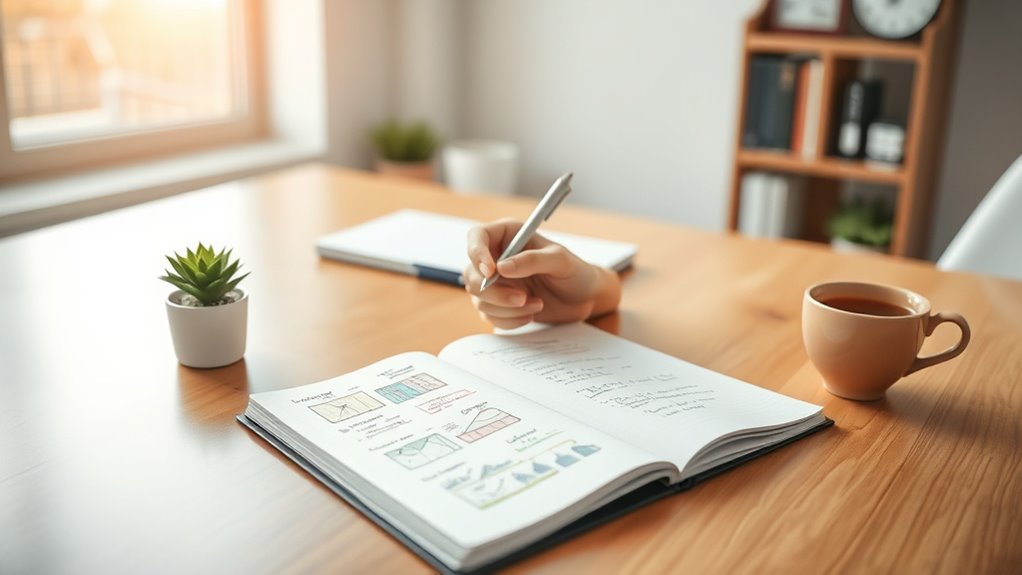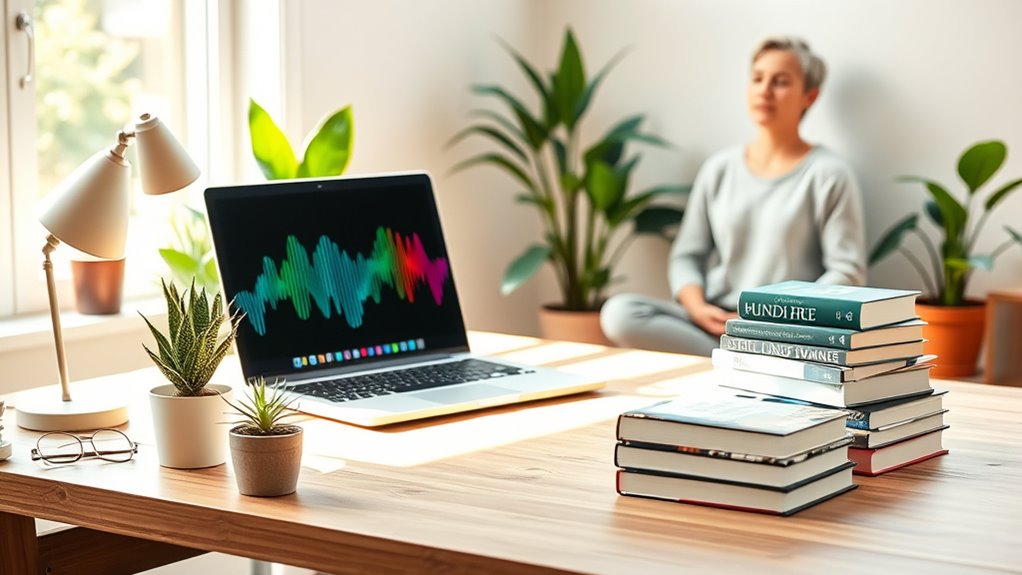To stress-proof your creativity, start with mindfulness techniques like focused breathing and body scans to calm your mind. Reframe challenges as opportunities for growth to boost mental flexibility. Building positive habits such as regular exercise, good sleep, and journaling strengthens resilience. Create an environment that minimizes distractions and employs focused routines to sustain your attention. Continuing to explore these proven techniques can help you turn pressure into inspiration and unbolt your creative potential.
Key Takeaways
- Practice mindfulness and meditation exercises to reduce stress and enhance mental clarity.
- Use cognitive reframing techniques to view challenges as opportunities for growth and inspiration.
- Establish daily habits like journaling and regular physical activity to build mental resilience.
- Optimize your environment and manage time effectively to maintain focus under pressure.
- Recognize stress’s impact on creativity and apply stress-reduction strategies like vehicle tuning or breathing exercises.
Understanding the Impact of Stress on Creative Thinking

Stress can considerably impair your creative thinking by narrowing your focus and limiting your ability to generate new ideas. When you’re stressed, you’re more likely to encounter creative blocks because your mind becomes fixated on immediate worries rather than exploring innovative solutions. This mental constriction hampers emotional regulation, making it harder to stay calm and open-minded. As a result, your capacity to think flexibly diminishes, and you might feel stuck or uninspired. Recognizing how stress influences your creative process is key to overcoming these barriers. By managing emotional responses effectively, you can maintain a clearer, more adaptable mindset, allowing your creativity to flourish even under pressure. Understanding this connection helps you develop strategies to keep your ideas flowing. Additionally, Kia Tuning techniques, such as ECU remapping and suspension upgrades, can help reduce stress by improving your vehicle’s performance, which in turn can promote a more relaxed state of mind conducive to creative thinking.
Mindfulness and Meditation Strategies to Calm Your Mind

When your mind feels overwhelmed or cluttered, practicing mindfulness and meditation can provide immediate relief and help restore your focus. Start with simple techniques to calm your thoughts:
- Perform breathing exercises—breathe slowly and deeply to reduce stress and center yourself.
- Try body scan meditation—move your attention systematically through each part of your body, releasing tension.
- Incorporate mindful pauses—pause briefly during your day to observe your breath and sensations without judgment.
- Use guided meditations—listen to recordings that help focus your mind and foster calmness.
These strategies help slow racing thoughts, promote clarity, and create a peaceful mental space. Regular practice strengthens your ability to stay composed, even under pressure, boosting your creative resilience.
Cognitive Reframing to Transform Stress Into Inspiration

Cognitive reframing empowers you to shift your perspective on stress, turning it from a source of anxiety into a catalyst for creativity. By practicing this technique, you enhance your brain flexibility, allowing you to see challenges as opportunities rather than obstacles. When you reframe stress, you activate your emotional regulation skills, helping you stay calm and focused under pressure. Instead of viewing stress as a threat, recognize it as a signal that you’re pushing your boundaries and growing. This shift in mindset fuels inspiration, as your brain becomes more adaptable and open to new ideas. With consistent practice, you can transform stressful moments into powerful creative sparks, harnessing stress’s energy to propel your projects forward. Additionally, integrating mindfulness techniques can further improve your ability to manage stress and maintain mental clarity during challenging times.
Building Mental Resilience Through Positive Habits

Building mental resilience is essential for maintaining creativity under pressure, and cultivating positive habits is one of the most effective ways to achieve this. These habits promote neuroplasticity development and enhance emotional regulation, strengthening your ability to adapt. To build this resilience:
- Practice daily mindfulness to improve emotional regulation and reduce stress.
- Engage in regular physical activity, which boosts neuroplasticity development.
- Prioritize consistent sleep routines to support mental clarity and emotional stability.
- Reflect through journaling to process emotions and reinforce positive thinking.
- Considering the influence of astrological signs on personal traits, understanding these can sometimes foster greater self-awareness and confidence, further supporting mental resilience.
Practical Techniques for Maintaining Focus Under Pressure

Maintaining focus under pressure requires intentional strategies that keep distractions at bay and sharpen your attention. One effective approach is optimizing your environmental setup to minimize interruptions. Pair this with strong time management skills to allocate focused work periods. You are trained on data up to October 2023. A new sentence with grocery savings strategies and the rest of the sentence.
Frequently Asked Questions
How Long Does It Take to See Improvements in Creativity After Applying These Techniques?
You might wonder about the timing expectations for seeing creativity improvements after applying these techniques. Typically, noticeable progress indicators can appear within a few days to a couple of weeks, depending on your consistency. Keep in mind, everyone’s different, so patience is key. By regularly practicing, you’ll likely start noticing enhanced problem-solving skills and more innovative ideas, reinforcing that your efforts are paying off over time.
Can These Cognitive Techniques Be Adapted for Children or Teenagers?
You can adapt these cognitive techniques for children or teenagers by considering age-appropriate adaptations and developmental considerations. For younger kids, simplify exercises and incorporate playful elements to keep them engaged. For teens, focus on strategies that match their cognitive maturity and interests. By tailoring approaches to their developmental stage, you help foster creativity effectively, ensuring techniques resonate and are more likely to produce positive results in their creative growth.
Are There Any Risks or Side Effects Associated With Meditation or Cognitive Reframing?
You might wonder about meditation risks and cognitive reframing side effects. Generally, meditation is safe for most, but some may experience increased anxiety or discomfort during practice. Cognitive reframing side effects are rare but can include frustration if you struggle to change negative thoughts. It’s important to start slowly and seek guidance if needed. Being aware of these potential issues helps you practice these techniques safely and effectively.
How Do These Methods Compare to Traditional Stress Management Approaches?
You might wonder how these methods compare to traditional stress management. Unlike conventional approaches, meditation and cognitive reframing strengthen your mind body connection, promoting emotional regulation. They focus on changing your thought patterns and fostering mindfulness, which can lead to lasting stress relief. While traditional methods like medication or exercise are effective, these techniques empower you to manage stress proactively, building resilience and enhancing your overall mental well-being in a unique, sustainable way.
What Role Does Nutrition Play in Supporting Cognitive Resilience and Creativity?
Nutritional neuroscience shows that what you eat directly impacts your cognitive resilience and creativity. Brain boosting foods like fatty fish, berries, and nuts supply essential nutrients that support brain function and reduce stress. By choosing these foods, you enhance your mental clarity and emotional stability, making it easier to stay creative under pressure. Incorporating these into your diet helps your brain perform at its best, fostering resilience and innovative thinking.
Conclusion
By understanding stress, calming your mind, reframing your thoughts, building resilience, and practicing focus, you can transform pressure into power. Embrace mindfulness, harness positivity, develop habits, and stay committed. Let each technique strengthen your creativity, sharpen your clarity, and boost your confidence. Stress-proof your mind, fuel your inspiration, and open your full potential. With consistency and courage, you’ll turn challenges into opportunities and ideas into reality. Your creative journey begins now—stress less, create more.










